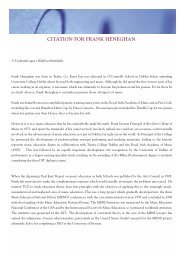TWICE THE SIZE - DIT Update - Dublin Institute of Technology
TWICE THE SIZE - DIT Update - Dublin Institute of Technology
TWICE THE SIZE - DIT Update - Dublin Institute of Technology
Create successful ePaper yourself
Turn your PDF publications into a flip-book with our unique Google optimized e-Paper software.
world leader in s<strong>of</strong>tware solutions and biotechnology, paving the way for future medical and<br />
scientific breakthroughs.<br />
Successive waves <strong>of</strong> enlargement continued EU expansion eastwards, <strong>of</strong>fering a wealth <strong>of</strong> new<br />
business opportunities, each providing cheap and well-educated workforces, and stepping-stones<br />
to larger markets to the East. In 2017, Switzerland, Norway and the Ukraine gained<br />
membership, to be followed in 2021 by Turkey. This last period <strong>of</strong> enlargement was based on<br />
the concept <strong>of</strong> a free trade multi-speed Europe where different coalitions <strong>of</strong> member states<br />
have been able to pursue different initiatives at their own pace. Turkey, with one <strong>of</strong> the fastest<br />
growing economies in the world during the 2020’s, as well as a dynamic youthful population,<br />
was able to cushion the pension crisis across an otherwise mostly ageing continent. In addition,<br />
Turkey’s geographical location, culture and religion have made it a bridge to the wider Muslim<br />
world.<br />
During the period 2010 to 2020, Europe managed to break away from the tradition, long-held in<br />
many countries, <strong>of</strong> extravagant social expenditure and strong public intervention. It was the<br />
development <strong>of</strong> the world economy, in general, and the success <strong>of</strong> President Hilary Clinton<br />
during her second term in modernising supposedly untouchable sectors such as health, education<br />
and social assistance, in particular, that swept away Europe’s uncertainties. The principles and<br />
practices <strong>of</strong> the New Democratic Party in the US quickly spread to Europe, favouring<br />
entrepreneurship, innovation and individual responsibility.<br />
Overall, the European economies have emerged well from the vagaries <strong>of</strong> the first part <strong>of</strong> the<br />
21 st Century – more competitive and more flexible. There has been rapid growth in small<br />
businesses and increasing openness to world markets. Indeed, the whole European economy has<br />
been reorganised in a more mutable manner, in line with technological innovation and the<br />
concentration on higher added value sectors.<br />
Economic change, however, gives rise for social concern. European societies are more<br />
fragmented than ever; individualism and relativism are dominant; and consumerism is overridingly<br />
the big idea. Europeans are now limiting their desire for solidarity to their immediate<br />
entourage, particularly their family. And generally, the public distrusts collective action,<br />
especially by governments and public service.<br />
IRELAND<br />
Always popular for its picturesque scenery and its unique culture, Ireland, that small island at<br />
the edge <strong>of</strong> Europe, has become a large player on the global stage, mainly through its worldclass<br />
advances in science and technology. Although geographically Ireland is part <strong>of</strong> the<br />
continent <strong>of</strong> Europe, and a long-standing and staunch member <strong>of</strong> the erstwhile European Union<br />
until its virtual demise after 2020, it is proving to have more in common with its nearest<br />
neighbour to the West – the United States <strong>of</strong> America.<br />
102








